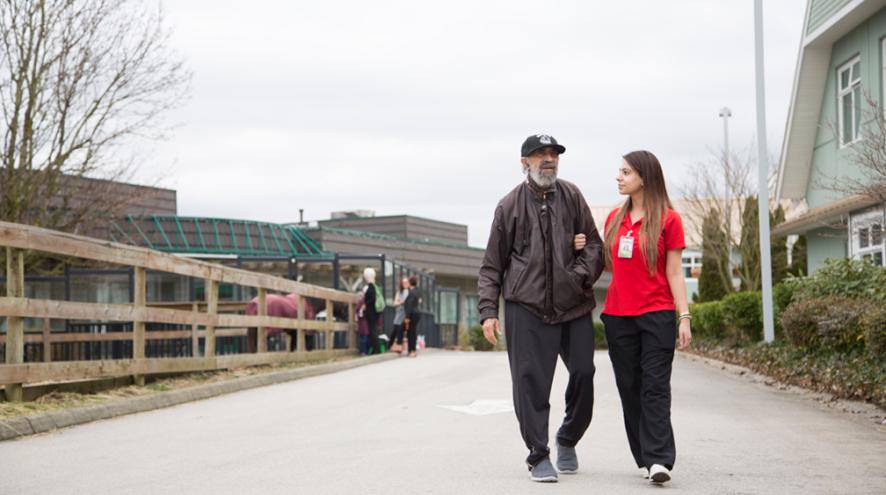People in B.C. deserve better dementia care, beginning with a timely diagnosis
Join us in advocating for improved access to dementia diagnosis and care this World Alzheimer’s Month.

Brian was a high school education assistant in Prince George whose child was attending the school where he worked when he started losing his way in the halls. Still in his 50s and not prepared to retire, Brian and his supportive partner Penny met with a geriatric assessment team. The middle-aged couple navigated the geriatric system until it led to a diagnosis of younger-onset dementia. It also led to Brian leaving his job the week after his child’s graduation.
Believing memory loss was a normal part of aging, Chuck in Kelowna waited for a decade before his problems began to include personality changes. Chuck’s wife Michele noticed the increasing anxiety and paranoia and they had to seek support. When Chuck was first diagnosed, the pair didn’t even want to tell their children about it.
Meanwhile in Vancouver, Roberta struggled to support her father with decision making as his condition declined and tensions with his doctor grew. For more than 10 years, Roberta has continued to be a caregiver to her father who lives with dementia – complicated by the fact it took a life-threatening illness and hospital stay to get a diagnosis, which her father still doesn’t acknowledge. Recognizing and accepting changes in memory and behaviour can be an understandably difficult process, making the diagnostic journey even more challenging in an already strained health-care system.
There are stories like these shared with the Alzheimer Society of B.C. in all corners of the province. Many of them are sad, others inspiring, some funny – but shockingly they are often devoid of one very important thing: a timely diagnosis.
September marks World Alzheimer’s Month and an opportunity to bring attention to this life-limiting disease and other dementias that an estimated 85,000 people live with across the province. It’s also a chance to consider an important question: How do we ensure British Columbians receive timely, equitable dementia diagnoses — just as they would for cancer or heart disease?
There are challenges associated with receiving a diagnosis.
First, people often avoid going to their doctor. Blame the enduring stigma – in a Leger Canada-led online survey conducted for the Alzheimer Society of Canada, one in five people stated that if they lived with dementia, they would avoid seeking help for as long as possible to avoid stigma. People often don’t go to their doctors for early symptoms out of fear of what might come next. The chronic shortage of family physicians in B.C. only adds another roadblock to seeking help early.
Once in the doctor’s office, we’ve heard from health-care providers that they struggle to diagnose a disease for which there is no cure. This medical nihilism often results in a “wait-and-see” holding pattern instead of empowering people with knowledge and resources.
Finally, while initial contact is typically with a family physician, dementia is often diagnosed by a geriatric psychiatrist, behavioural neurologist or geriatrician. However, according to a 2021 study published in the Canadian Geriatrics Journal, the number of geriatricians in B.C. stood at only 60 as of 2019, significantly below the benchmark requirement of 118. Projections show that nearly 170 will be needed by 2030.
Why does this matter? A timely diagnosis gives people a chance to react. It means someone can plan and express their wishes, make lifestyle changes, seek support and learn about the disease. Diagnosis also gives decision-makers in the health-care system a full sense of the number of people affected and, one day, hopefully helps ensure they have access to disease-modifying therapies.
For Brian and Penny, the diagnosis was both a gut punch and a step towards coping. It was painful to receive, but it gave the couple a reason behind changes in behaviour. Chuck and Michele did tell their children about Chuck’s diagnosis in the end. Disclosing the diagnosis allowed the family to move forward together and the children to offer their support. Michele thinks they saw it coming anyway.
We don’t have to resign ourselves to the status quo. There are system-level changes we can make to support people living with dementia to get the diagnoses they deserve. A clear pathway where people know what to expect in terms of treatment options and resources will lead to better care. Targeted incentives, such as a loan forgiveness programs, could help incentivize more new graduates to specialize in seniors’ care – and we can all play a role in challenging the stigma associated with dementia.
Changes can’t wait. By 2050, approximately a quarter of a million people will be living with dementia across the province. Family caregivers will provide them with nearly 200 million hours of unpaid care annually.
For people facing a recent diagnosis – and for families like Roberta and her father, who might not – we are here to help.
Access a suite of Alzheimer Society of B.C. programs and services, information and resources and a community of support by calling the First Link® Dementia Helpline at 1-800-936-6033.
